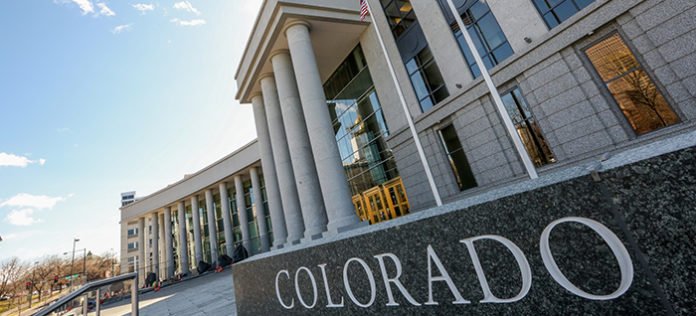
The Colorado Supreme Court heard oral arguments Wednesday in a case that could affect the process state employees face when their cases go before an administrative law judge.
The case, as it appears before the Supreme Court, questions whether an ALJ on the Colorado State Personnel Board applied the appropriate standard of review when evaluating a decision from an appointing authority — in this case, a Department of Corrections warden. Simply put, should an ALJ give deference to an appointing authority’s disciplinary decision or, as an attorney for the personnel board put it, would that render the ALJ’s review only a “rubber stamp”?
A Department of Corrections warden had terminated a prison employee, Matthew Stiles, after finding through a random drug test that he had used marijuana while off-duty. Stiles appealed the decision, and a personnel board ALJ found the discipline was too severe. That decision was then appealed to the Colorado Court of Appeals which upheld the decision, finding the ALJ’s de novo review of the case was appropriate.
An attorney for the Department of Corrections argued to the Supreme Court that the ALJ applied de novo review and reweighed the facts of the case — which she argued was overstepping its authority. According to statute, an ALJ must apply an “arbitrary and capricious” standard — reviewing whether a decision was made fairly or arbitrarily — or whether they can apply de novo review.
The attorney for Stiles, agreed that the ALJ applied de novo review but argued that the standard of review was appropriate since, as she argued, the ALJ should be viewed as a neutral and independent fact-finding body that should not give deference to the warden’s disciplinary decision.
The question of standard of review was a primary facet of the arguments. A prior case, Lawley v. Department of Higher Education lays out a test for determining whether an appointing board acts arbitrarily and capriciously and that a decision should be overturned:
• By neglecting or refusing to use reasonable diligence and care to procure such evidence as it is by law authorized to consider in exercising the discretion vested in it.
• By failing to give candid and honest consideration of evidence before it on which it is authorized to act in exercising its discretion.
• By exercising its discretion in such manner after a consideration of evidence before it as clearly to indicate that its action 13 is based on conclusions from the evidence such that reasonable men fairly and honestly considering the evidence must reach contrary conclusions.
Katherine Aidala, representing the Department of Corrections, said the ALJ applied de novo review and re-weighed the evidence found by the warden — a factor that justices Richard Gabriel and William Hood pressed Aidala on. Aidala said the ALJ’s decision stated the warden didn’t give proper weight to the evidence and that he found it too severe a penalty.
The warden considered all of the factors, weighed them and reached a result. The ALJ reviewed those factors, reweighed them and reached different result, indicating de novo review Aidala said.
Hood pushed back on that assertion, questioning whether the ALJ had discretion to review a finding or was simply limited to give deference to the warden’s decision and determine whether it was appropriate. “Under the way you’re interpreting this, it really gives the warden carte blanche. How does the ALJ ever get a chance to say, ‘I don’ think you’re being sincere about this?’”
Aidala said the Lawley test only gives the ALJ the ability to make an adverse credibility determination — to evaluate whether the warden made an “honest and candid” review of the facts and made a disciplinary decision fairly.
Amy Lopez, who argued for the personnel board, said the board appropriately applied the arbitrary and capricious standard, but that standard doesn’t prevent the board from hearing the facts of a case de novo and reviewing new evidence.
“The deferential standard of review the DOC seeks would hinder the ability of the board to be an independent fact-finding body and will render hearings before the board meaningless,” Lopez said.
In response to a question from Gabriel about how the arbitrary and capricious and de novo standards fit together, and what deference the personnel board must give to the warden in the case, Lopez said the personnel board gives deference in the facts of an incident as well as whether discipline was required, but everything after that should be reviewed de novo, with both parties able to present new evidence to the ALJ. “The ALJ is not reweighing evidence, it is reviewing it for the first time,” Lopez said.
For much of Lopez’s arguments, the justices’ questions to Lopez focused around that deference and whether the ALJ should make a decision de novo.
“Your arguments seem to be coalescing around how de novo and arbitrary and capricious fit together. It seems that the ALJ is not starting over, not deciding whether there was an act or whether discipline was appropriate but taking evidence and making a decision based on the evidence as to whether it was arbitrary and capricious under Lawley,” Gabriel said, summing up the arfguments. “What’s in front of the ALJ was whether it was arbitrary and capricious. That requires taking evidence and making a judgment.”
Lopez said Gabriel was correct and emphasized the importance of the case as it relates to how other disciplinary decisions would be made for state employees.
“This process, provided by board is especially important because thousands of state employees rely on this process. To change and alter this would be a drastic alteration of the status quo, and It would change the board’s role from being an independent fact-finding body to rendering hearings before the board meaningless.”
— Tony Flesor

